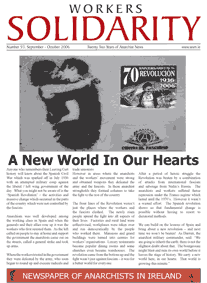Imperialism, in its most basic form involves wealthy and powerful governments using their military power to invade poorer parts of the world in order to impose their control upon them. There isn’t the space to go into all aspects of imperialism here, so I’m concentrating on the military form.
In modern times, imperial invaders always claim that their invasions are for the good of the people who they are invading. They claim that they want to bring civilisation, democracy or freedom to the natives. In reality, the imperialist ruling class simply want to extend their power by bringing more of the world under their control and often their motives are as simple as a desire to get their hands on the natural resources of the place that they are invading.
Despite their claims to have lofty motives, imperialist invasions are almost always followed by bloody and brutal campaigns of subjugation against the natives. From the conquest of Africa in the late 19th century, to the conquest of the Middle East today, the rhetoric about freedom and democracy quickly evaporates leaving nothing but bloody slaughter and oppression backed up by military might.
Anarchists believe that people should be in control of their own lives and should have a say in how the resources in the places where they live are used. Therefore, anarchists are opposed to imperialism and they are not alone in this. Almost nobody likes it when a powerful group invades the place where they live, steals all the resources and orders them to do as they are told and, inevitably, they organise themselves to oppose the imperialists. Since imperialists use force of arms to control the countries which they invade, this generally means that the natives will need to physically oppose them. They aren’t going to leave just because they’re unpopular, after all.
Thus, anarchists support people’s right to fight against imperial invasions. If somebody has decided to control you with violence, you have no choice but to overcome this violence or else remain a slave. This is why anarchists call themselves anti-imperialists.
However, unfortunately, anarchists are currently a small minority in the world. Nationalism has been the most powerful political ideology in modern times. When people fight against imperialist control, they also generally fight for some version of nationalist alternative.
Anarchists are opposed to nationalism. We do not think that people can be neatly divided up into areas where the populations have a shared culture, history and heritage. The world is much messier than that and cultures and identities are fluid and intermingled. What’s more, nationalist movements normally simply try to replace the foreign imperialist control with control by a local ruling class, who might be just as bad - or even worse - than the imperialist rulers. Therefore, while we support anti-imperialist struggles, we always strive to argue against nationalist politics within them. Instead we seek to promote the most progressive, libertarian and socialist strands so that, if we can defeat the imperialists’ control, we won’t just be replacing them with new masters.
In practice, this is a difficult position to realise since conflicts are, by their very nature, polarising. During struggles against imperialism, it is very common for people to claim that “you’re either with us or against us”. So, in Iraq at the moment, both George Bush and Osama Bin Laden claim that you have to choose one side or the other. You either support the imperial invaders of the US/UK armies or you support the Islamic resistance. However, the real world is always more complex than this. There are currently many groups in Iraq, and around the world, who reject this choice. In Iraq there are many groups - workers’ unions, women’s groups and others who promote civil liberties and democracy that are opposed to the occupation and opposed to Islamic fundamentalism. Rather than accepting the binary choice of Bush and Bin Laden, we choose to support these forces, to offer them whatever assistance we can in their fight against the occupation and against the fundamentalists.
From Workers Solidarity 93, Sept/Oct 2006


